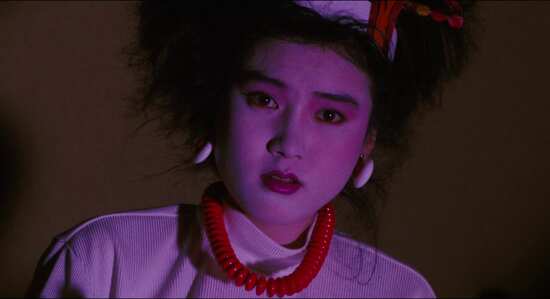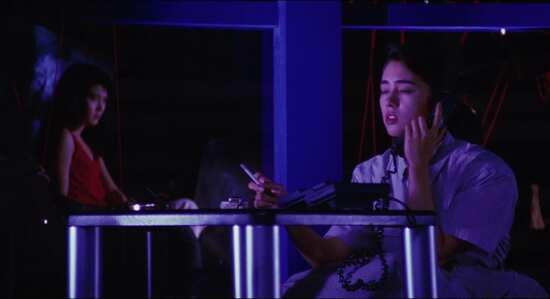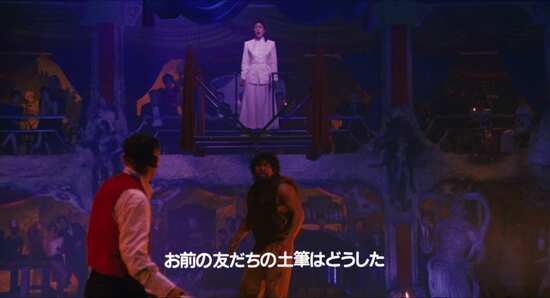Review for Luminous Woman
Introduction
Six months ago, Third Window Films brought us four features from Japan’s Directors Company, Door and Door 2, The Guard From Underground, and Typhoon Club. This was the collaboration between directors like Sogo Isshi, Kiyoshi Kurosawa, and Shinji Somai which over the space of 10 years, between 1982 and 1992 gave them the space to innovate and experiment outside of Japan’s monolithic studio system. This would herald the burst of independent creative fervour that would subsequently come in the nineties and early two thousands, indeed the lifeblood of Third Window Films catalogue. This summer, Third Window Films are releasing three more features from The Director’s Company, The Crazy Family, Love Hotel, and beginning with this, Luminous Woman from Shinji Somai, the director of Typhoon Club.
Sensaku travels from the mountains of Hokkaido to Tokyo to look for his sweetheart Kuriko. He’s powerfully built, wears furs, and walks barefoot, so he certainly makes an impression. The plan was for Kuriko to study in Tokyo, and return home so that they can get married and run a farm. It’s an unforgettable arrival in the city; he wanders into a garbage dump, where strangely he finds an opera singer, a pianist, and the man who is her patron. That man promises to reunite Sensaku with his betrothed, if he will take part in the death-matches he runs. But Kuriko is no longer the woman that Sensaku recalls, and meanwhile he develops an obsession with the singer, Yoshino Koyama, who has been unable to sing for a long time, but in turn finds inspiration in Sensaku.
The Disc
Luminous Woman gets a 1.85:1 widescreen 1080p transfer on this disc, with DTS-HD MA 2.0 Stereo Japanese audio and optional English subtitles. At the head of the film, there is a disclaimer explaining the extensive digital restoration the film has seen. But it is a film of its time, almost 40 years old now, and while the print on this disc is clear, colours are consistent, and print damage is largely, but not completely eliminated. Yet the presentation is a little soft, and quite grainy, indicative of the film stock of the period, and there is a creative choice to give the film a purple tint throughout. The audio is fine, clear and well balanced. The dialogue is clear and the subtitles are accurately timed and free of typos. There are burnt in Japanese subtitles for the non Japanese dialogue (particularly the opera lyrics).
Extras
The disc presents the film with an animated menu, and you’ll find the following extras.
Trailer (0:32)
Making Of (49:13)
Deleted Scenes (50:30)
Note that the making of featurette has been recovered from broadcast videotape, and varies in quality throughout, while the deleted scenes have been recovered from rushes, and lacks audio (although dialogue is subtitled).
Conclusion
It was Third Window Films that introduced me to just how bizarre and out there Japanese cinema can get, especially the independent sector. It’s not all just yakuza and kaiju movies. But I think I can be forgiven for thinking that it’s all a thing from the late nineties onwards. After all, those are the films that Third Window Films began with. Luminous Woman is from the mid-eighties however, and last night was the first time I had this particular feeling watching a Japanese film since I saw Love Exposure. It was a sense of incredulity at what I was seeing unfold on screen. The ideas and vision of this film are so surreal and leftfield that they gave me figurative whiplash, and the film has stayed with me long after the end credits have rolled. It’s one of those insidious growers of a movie.
It’s not on the same level as Love Exposure though, and it took me a fair while to get into it. It takes some time to wrap your head around the blend of professional wrestling and opera. Sensaku is played by Keiji Muto, a genuine professional wrestler, and Luminous Woman isn’t exactly Suburban Commando, or They Live, where a wrestler starring in a movie makes sense in context. Luminous Woman is a surreal romantic drama for want of a better description, and there are wrestlers who are better actors than Keiji Muto. By the same token, the singing sequences rely on a lot of lip sync, which doesn’t always match up. The film requires a lot of suspension of disbelief to work, and thankfully the surreal atmosphere and style around it work sufficiently to detract from its weak points.
You get an idea at just how bizarre this film is with Sensaku’s introduction, a wild man seemingly walking through a post-apocalyptic wasteland. It’s not an end of the world scenario though, just one of Tokyo’s extensive landfill sites, and it’s where he comes across the tableau of an opera singer atop a pile of discarded appliances, with piano accompaniment performing to one solitary man. This man offers to reunite Sensaku with his fiancé, if he agrees to fight to the death against his champions. This takes place in an underground circus, an arena for gladiatorial combat with added sideshow performers, and a live opera soundtrack.
He survives his first fight, but his reunion with Kuriko is not how he expected it to be. But he does develop a relationship with the singer Yoshino. Despite the opening sequence, she’s been refusing to sing for her patron, feeling empty inside. But watching Sensaku fight awakens her emotions again. However her patron, the man who’s put Sensaku in the arena, is possessive indeed.
Luminous Woman really sets up this idea of the rural areas of Japan as pristine and innocent, whereas the city is a corrupting force, twisting all who reside there to their most base instincts and desires. Sensaku is like a force of nature who blows in, and who causes those he encounters to re-evaluate their lives and change, for good or for ill. Just like a force of nature, he isn’t exactly aware of the effect that he has on people, pretty much acting on instinct himself.
The imagery and the ideas, the bizarre twists and turns that the story takes makes Luminous Woman well worth experiencing at least once. I couldn’t quite click with the film on an emotional level however, which left the film feeling rather cold. Luminous Woman is available direct from Arrow Video, from Terracotta, and from mainstream retailers.









Your Opinions and Comments
Be the first to post a comment!